VPN Use Keeps Growing in 2025
VPN use keeps climbing in 2025 as privacy awareness, streaming demand, and censorship push people straight into the arms of providers. Top10VPN reports record-high growth in VPN demand—827% in 2025 for the U.S. alone.
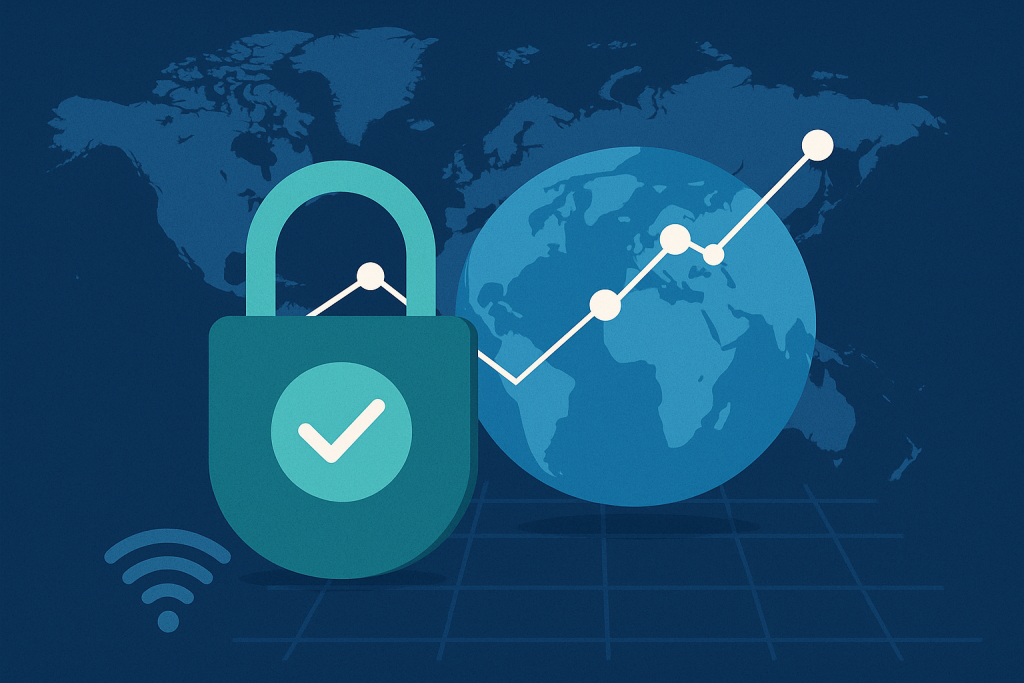
In this data-driven article, I use the latest global VPN usage statistics from 2025 to show how many people use VPNs, which countries lead in VPN adoption, and what the VPN landscape looks like.
How Many People Use VPNs Worldwide
Industry estimates put the number of VPN users worldwide in 2025 at roughly 1.7–1.8 billion people—about a third of all internet users. That’s a big jump from earlier years and shows VPNs have moved from niche tools to mainstream, everyday utilities for millions of people.
💡 Quick tip: Why use a VPN?
Most people use a VPN for privacy, access, and security. It reduces exposure on untrusted networks, helps you reach the content you need, and can be part of a safer remote work setup.
Speaking of VPN usage by country, Surfshark’s chart estimates India with over 403 million VPN users and China with over 319 million—together accounting for more than half of the overall VPN market share in 2025. Huge populations are the main factor: even relatively modest adoption rates translate to very large user counts. Put simply, the more internet users a country has, the larger its absolute number of VPN users will tend to be—so large Asian markets naturally dominate the totals.
Largest VPN markets
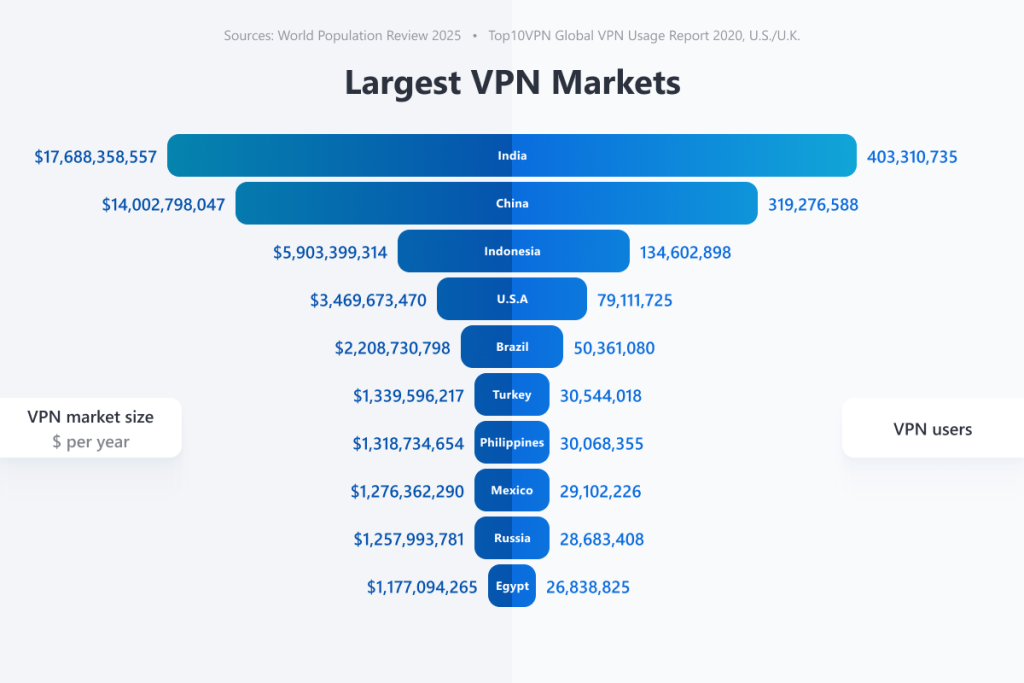
Source: Surfshark
On the market side, estimates vary by firm, but several analysts place the VPN services market at over $52 billion in 2024, with forecasts showing continued VPN market growth by almost 14% each year into the next decade, reaching roughly $170 billion by 2033, as consumer and corporate demand remain steady. These figures reflect both subscription revenue and enterprise spending on remote access and cloud VPNs.
VPN market forecast
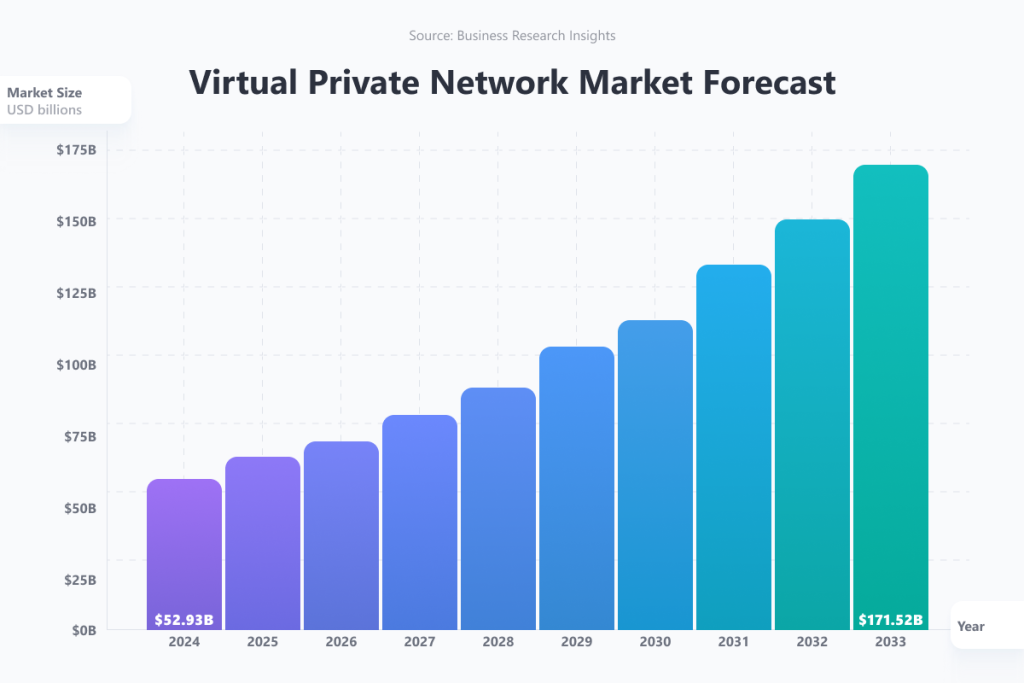
Source: Business Research Insights
Which Countries Lead in VPN Usage
Worldwide VPN adoption is uneven: we see VPN app downloads surge sharply in some countries due to censorship or platform blocks, while in others they grow steadily and are driven by streaming and privacy habits. But even though the reasons vary, the VPN market trends in 2025 clearly show that VPN usage is rising across most regions.
💡 Quick tip: When to use a VPN:
- On public Wi-Fi (to protect privacy on public Wi-Fi networks).
- When you need access to region-locked content or work resources.
- While traveling or using unsecured networks.
- If you’re in a country with active content blocking or surveillance.
- To avoid throttling during streaming or gaming.
Top10VPN tracked dramatic short-term spikes in demand in several countries this year following policy changes, platform restrictions, or internet shutdowns—proof that limitations often give people more reasons to use a VPN.
VPN demand surges in 2025
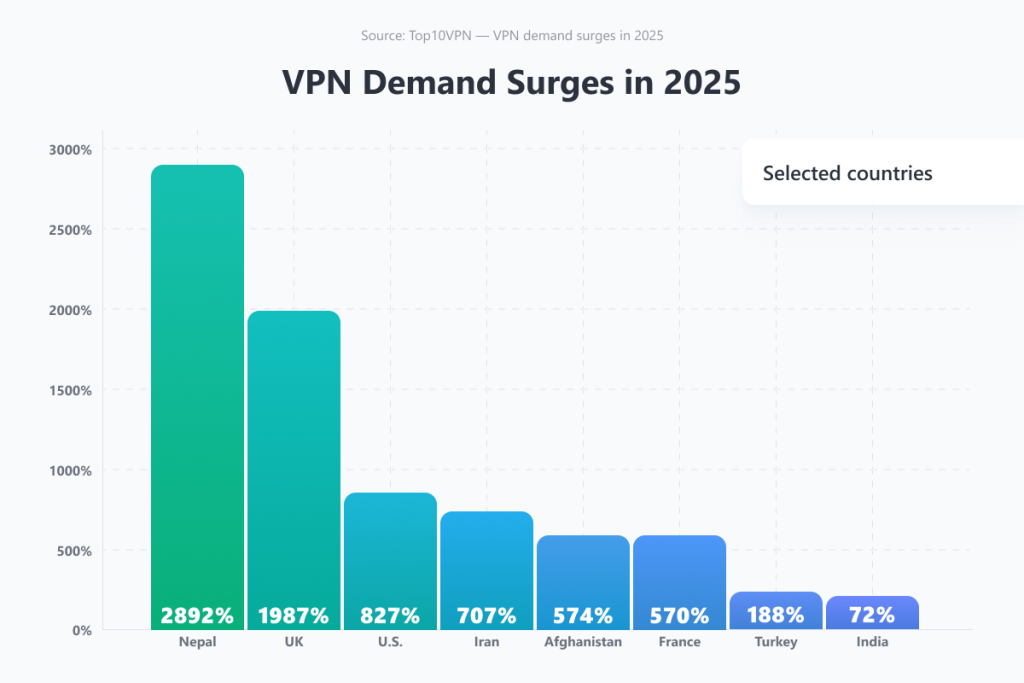
Source: Top10VPN
In terms of adoption percentage, numbers vary by source and year but fit the same growth trend. According to Cybernews, the countries with the highest average VPN adoption rates (2020–2025 combined) are dominated by the Persian Gulf and a handful of island or small states.
Top 15 countries by average VPN adoption (2020–2025)
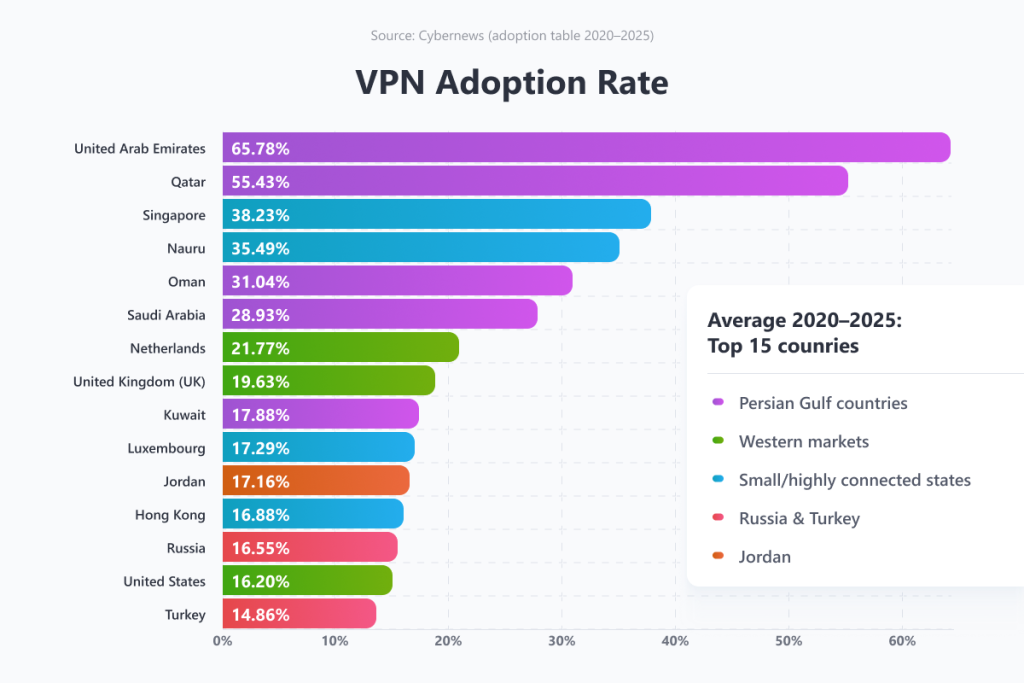
Source: Cybernews
But why these countries? As mentioned, the reasons vary, so let’s break them down:
Persian Gulf countries (UAE, Qatar, Oman, Saudi Arabia, Kuwait)
High adoption in these states ties to a mix of broad content filtering, restrictions on VoIP services, heavy expatriate populations who need international access, and relatively strong ability (and willingness) to pay for privacy or access tools.
Small/highly connected states (Singapore, Nauru, Luxembourg, Hong Kong)
Cross-border content demand, frequent business travel, and consumer willingness to pay push these small or highly connected places up the adoption charts.
Western markets (Netherlands, UK, United States)
These markets show solid adoption mainly driven by privacy awareness, streaming needs, and remote work. Percentages are lower than the Gulf states, but recent age verification laws in several European countries and U.S. states can trigger massive surges in installs—and VPN usage statistics from 2025 already back that up.
Russia & Turkey
Political events, platform blocks, and information controls force people in both countries to set up VPNs to keep access to popular services and defend their privacy. Russia’s 43.2% jump in 2022 is a clear example of how conflict and restrictions can dramatically raise adoption.
Jordan
Jordan’s adoption started to grow rapidly after the TikTok block in December 2022, and the trend continued when Discord was reportedly blocked in October 2025, leading to up to a 250% signup spike for Proton VPN alone.
Where VPN Use Is Restricted
Not all growth happens in a permissive legal environment, and VPN usage legal status differs by country. To begin with, in which countries is it illegal to use a VPN? VPNs are outright banned in a handful of places:
- North Korea
- Turkmenistan
- Belarus
- Iraq
Then there are markets that allow some VPN use but impose restrictions:
- China: Personal VPN usage in China is restricted. Only government-approved or enterprise VPNs are technically legal.
- Iran: Many people use obfuscation tools to reach news and communication platforms, but most consumer VPNs are blocked.
- Oman: Personal VPN use is restricted unless using a government-approved service. Corporate VPNs may be permitted if they comply with local requirements to retain user activity logs.
- Myanmar: Since 2021, the military junta has restricted unauthorized VPN use.
Many countries don’t ban VPNs but regulate providers, compel cooperation with law enforcement, or make circumvention an aggravating factor when other laws are broken. That typically means VPNs are fine for privacy, streaming, and remote work, but using one to commit a crime can increase penalties. Here are some countries where VPN use sits in the legal gray zone:
- Russia: VPN use is legal for legitimate purposes, but providers that refuse to comply with content restriction orders can be blocked. Also, VPN use can aggravate criminal cases.
- Turkey: VPNs are used widely, but the government blocks providers that enable circumvention of specific orders.
- Saudi Arabia: VPN usage is legal in Saudi Arabia for business purposes and tightly regulated for personal circumvention. Criminal liability is possible if VPNs are used to commit illegal acts.
- United Arab Emirates: Concerning the UAE VPN usage legal status in 2025, the picture is much like Saudi Arabia’s: VPNs are allowed for legitimate uses, but using one to commit a crime can carry penalties.
Why VPN Usage Is Increasing Worldwide
So why do people use VPNs, and why is the number of users constantly growing? Let’s unpack the main motivations behind global VPN usage growth:
- First—privacy and surveillance. More people worry about tracking, data collection, and ISP monitoring and want to reduce direct tracking on open Wi-Fi, hide activity from their ISP, and limit profiling by ad platforms. Surveys show that over half of users cite privacy as a top reason to use a VPN.
- Second—streaming and geo-access. Geo-restricted catalogs, age verification rules, and service blocks push everyday users to VPNs. Event-driven surges in demand underline how content rules and platform outages translate directly into new VPN installs.
- Third—security and remote work. Corporate remote access needs, SASE adoption, and the growth of cloud VPN products keep demand in secure VPN solutions healthy.
- Finally—political events and censorship, like governments blocking social media or throttling networks, are getting more frequent—another strong point to the list of reasons to use a VPN in 2025.
Most common reasons for using a VPN
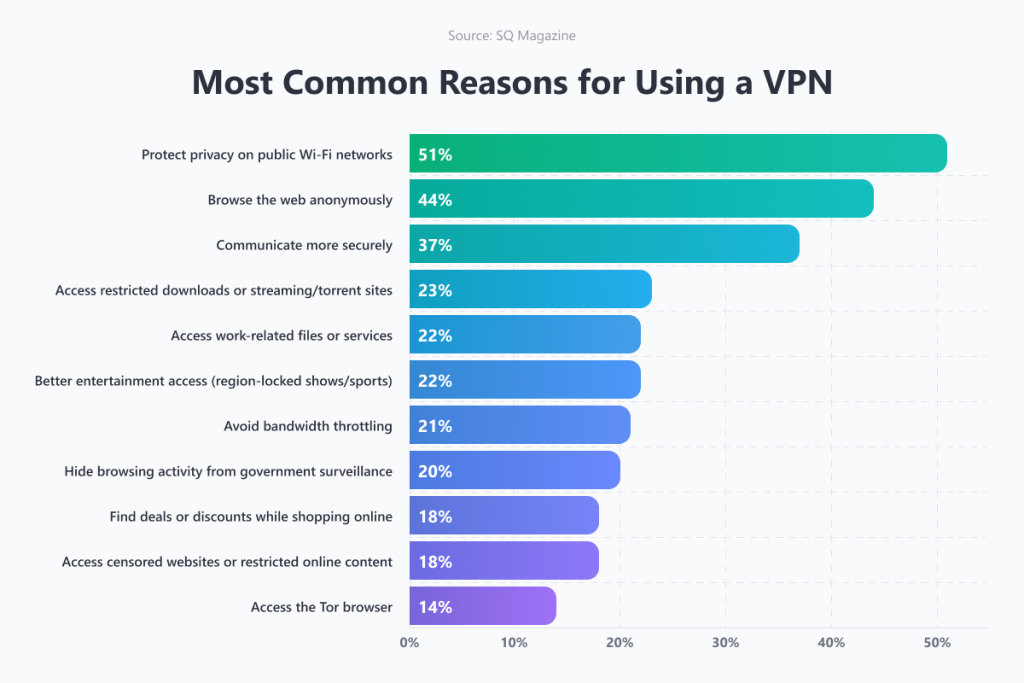
Source: SQ Magazine
Combined VPN usage statistics show that adoption keeps growing, and VPNs are already a standard tool in many users’ online arsenal. So should I use a VPN? Since the internet now carries more of our money, entertainment, and conversations—and if you want to protect access and your privacy—I believe the answer is a definite yes.
💡 Quick tip: Should I always use a VPN?
Not necessarily. A VPN can be useful when you’re on public Wi-Fi, working with sensitive data, or accessing geo-restricted content, but it’s not a legal shield and can affect performance. Use a reputable provider and turn a VPN off when it breaks services you need (banking or local services tied to your real region).
VPN Market Trends and Outlook for 2025–2026
The global trend is clear: the VPN sector is shifting from niche privacy tools to mainstream internet infrastructure. Analysts point to continued VPN market growth in 2025, with forecasts clustering around double-digit compound annual growth rates at ~13–14% for the next decade. Three trends to watch:
- Increasing capacity demand: Rising adoption rates are pushing providers to invest in faster networks and larger-capacity servers to handle higher aggregate VPN traffic usage at faster speeds.
- Regional growth hotspots: Asia and the Middle East should continue above-average growth. Some Western markets may slow in user share growth but will remain revenue-heavy due to higher ARPU (average revenue per user).
- Innovation vs. regulation: Governments cracking down on VPNs push providers to innovate (obfuscation, domain fronting, decentralized models). We can expect a continuing cat-and-mouse pattern: policy tightening → technical workarounds → new regulatory responses.
Bottom line, VPN popularity is rising and likely to keep growing. If current trends continue, total VPN users could exceed 2 billion within a few years, while VPN market share and enterprise demand are likely to expand, though unevenly by region.
The Global VPN Landscape Is Shifting
VPN usage statistics in 2025 show demand for VPNs is global and driven by a mix of privacy, access, and security needs. The Gulf states and some small, highly connected markets top the list by adoption, while India, China, and Indonesia lead in absolute user and dollar count.
The legal landscape is changing, with more countries imposing restrictions or seeking to regulate the VPNs. However, legal complexity doesn’t turn people away—it only changes how we choose providers and features.
As for the future, VPN usage is anticipated to keep growing in the next decade, and the prospect of surpassing the 2 billion user mark and $100 billion VPN market size is already within reach. For 2026 and onward, we expect increasing infrastructure investments, stronger regional growth in APAC/Middle East, and continued tension between regulation and technical innovation.
FAQs
Which country has the highest VPN usage in 2025?
By raw user count, the leaders are India, China, and Indonesia. By penetration, the Gulf countries (UAE, Qatar, Oman, and Saudi Arabia) and Singapore are often placed at the top. Exact ranks vary by dataset.
Is it illegal to use a VPN in some countries?
Yes—some countries ban VPNs (North Korea, Turkmenistan, Belarus, and Iraq); others restrict or tightly regulate them (China, Iran, Oman, Myanmar); and a third group allows VPNs but penalizes misuse (Russia, Turkey, UAE, Saudi Arabia).
Why are more people using VPNs in 2025?
Main drivers are privacy and surveillance concerns, streaming and geo-access needs, and security for remote work or public Wi-Fi. Political events and internet restrictions also cause sudden surges.
How big is the VPN market in 2025?
Market estimates place the VPN industry around $60 billion in 2025. User counts are roughly 1.7–1.8 billion in 2025 with forecasts to ~2 billion in the near term.




